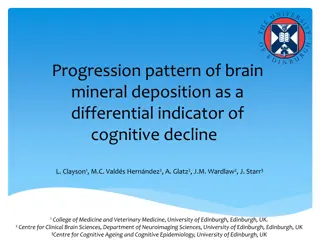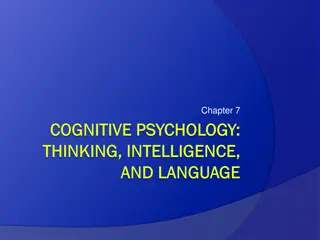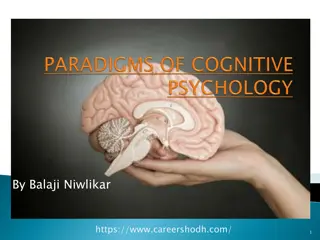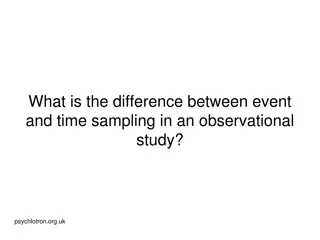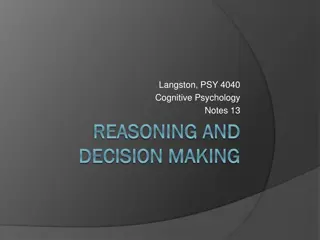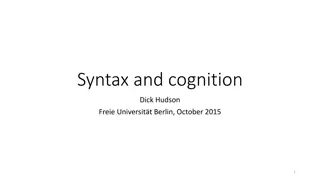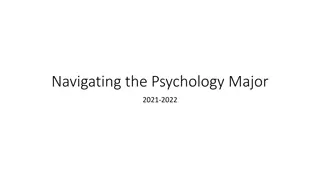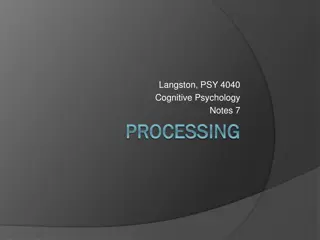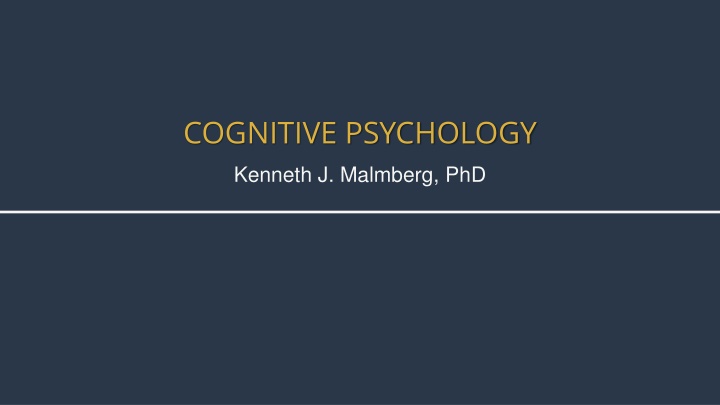
Exploring Key Figures in Cognitive Psychology History
Delve into the pioneering work of Franciscus Donders, Herman von Helmholtz, and Hermann Ebbinghaus, who laid the foundations in cognitive psychology through studies on mental chronometry, unconscious inference, and memory savings.
Download Presentation

Please find below an Image/Link to download the presentation.
The content on the website is provided AS IS for your information and personal use only. It may not be sold, licensed, or shared on other websites without obtaining consent from the author. If you encounter any issues during the download, it is possible that the publisher has removed the file from their server.
You are allowed to download the files provided on this website for personal or commercial use, subject to the condition that they are used lawfully. All files are the property of their respective owners.
The content on the website is provided AS IS for your information and personal use only. It may not be sold, licensed, or shared on other websites without obtaining consent from the author.
E N D
Presentation Transcript
COGNITIVE PSYCHOLOGY Kenneth J. Malmberg, PhD
HISTORY OF COGNITIVE PSYCHOLOGY Kenneth J. Malmberg, PhD
Franciscus Donders men tal (adj.) Of or relating to the mind; intellectual. chro nom e try (n.) The scientific measurement of time. Franciscus Donders: Investigated Mental Chronometry MENTAL CHRONOMETRY The study of the mind s timing
Franciscus Donders: Reaction Time Specifically, Donders sought to measure how long cognitive process take (I.e., reaction times). A reaction time is an interval between the presentation of a stimulus and a response. Franciscus Donders
Donders: Simple Decision Task Lots of things (processes) happen during this interval and the challenge was to measure the how long each process took given only the overall reaction time. How long did it take for the subject to decide whether the stimulus appear on the right side of the screen or the left side of the screen?
Donders: Method of Subtraction How long did it take for the subject to decide whether the stimulus appeared on the right side of the screen or the left side of the screen? Franciscus Donders
Herman von Helmholtz UNCONSCIOUS INFERENCE Perceptions are the results of unconscious assumptions that we make about the environment. Why we would we need to make ? Herman von Helmholtz: Investigated Perception inferences about what we see?
Helmholtz: Unconscious Inference UNCONSCIOUS INFERENCE Perceptions are the results of unconscious assumptions that we make about the environment. Herman von Helmholtz: Investigated Perception
Hermann Ebbinghaus SAVINGS The amount of time it takes you to relearn something relative to the amount of time it took you to originally learn the material is an estimate of the amount of information that was still stored in memory. Hermann Ebbinghaus: Investigated Learning and Memory
Hermann Ebbinghaus: Savings SAVINGS The amount of time it takes you to relearn something relative to the amount of time it took you to originally learn the material is an estimate of the amount of information that was still stored in memory. Initial Learning - Relearning Savings = 100 x Initial Learning
Structuralism in the 19th Century STRUCTURALISM The theoretical approach that dominated the late 1800s. SENSATIONS ANALYTIC INTROSPECTION Our overall experience is determined by combining basic elements of experience called sensations. Sensations could be combined in ways that were similar to the manner in which chemical elements of the periodic table could be combined. The key question involved identifying and relating these sensations. The main technique was analytic introspection: Trained participants described their experiences and thought process in response to stimuli.
Behaviorism: Watson According to John Watson, there two main problems with analytic introspection: 1. The results were inconsistent 2. The results were impossible to verify Behaviorism: 1. rejects introspection as a method 2. rejects consciousness as a topic for investigation 3. states that behavior is the only topic for study John Broadus Watson
Behaviorism: Skinner B.F Skinner Introduced operant conditioning, which focused on how behavior is strengthen by presentations of positive reinforcers and the withdrawal of negative reinforcers. Reinforcement Schedules (e.g., fixed interval) Cumulative Response Record: plots the number of responses as a function of time. These functions are scalloped .
The Cognitive Revolution Noam Chomsky criticized B.F. Skinner s theory of language development. According to Skinner, language is learned my reinforcing the proper mimicking of adult language by infants. Chomsky noted that children produce language that they never heard before. He proposed that children are born with certain capacities that allow language to develop. This opened the way for investigating and theorizing about the nature of these capacities independently of behavior. Noam Chomsky
Cognitive psychologists were the first to study human psychology in a scientific manner
Donder's goal for using the subtraction method was to measure the duration of simple cognitive processes.
von Hemlholtz believed that mind perceives only what is in our present environment.
The mind has a terrible time dealing with ambiguous information.
A key problem with the structuralist approach concerned the methods that they used.
Skinner's debate with Chomsky led to the behavioral revolution.

